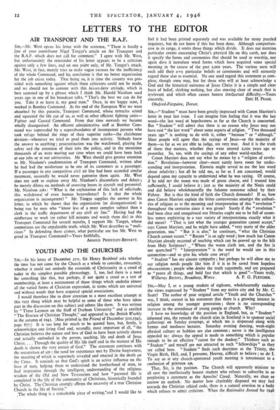YOUTH AND THE CHURCHES
SIR,—In his letter of December zest, Sir Henry Bashford asks whether the time has not come for the Church as a whole to consider, reverently, whether it could not embody the essentials of Christianity in a creed of today in the simplest possible phraseology. I, too, feel there is a need for something like this, but perhaps, if not quite a creed as a test of membership, at least a restatement of those things which underlie almost all the varied forms of Christian expression, in terms which. are universal and without words that have acquired special associations.
I would therefore like to draw attention to a most excellent attempt at this very thing which may be helpful to some of those who have taken part in the discussion on this subject and others like them. It was written by " Three Laymen on the Staff of Durham University " and is entitled " The Essence of Christian Thought," and appeared in the British Weekly in the autumn of 1943. (Also printed in the Friend of December 315t,1943, page 877.) It is too long for much to be quoted here, but, firstly, it acknowledges one living God and, secondly, most important of all, "the Christian believes the nature and love of God to have been actively shown and actually embodied in the person, teaching, life and death of Jesus Christ.... Through the quality of His life itself and in the manner of His death is shown the very nature of God." The statement continues with the recognition of sin ; the need for repentance met by Divine forgiveness, the meaning of which is supremely revealed and enacted in the death on the Cross. It reminds us that God's spirit is an active influence on the lives of men, helping them to understand the brotherhood of man, to find inspiration through the intelligent, understanding of the religious wisdom of the Old and New Testaments and how " personal life is completed in the life of the community of Christians, historically founded by Christ. The Christian strongly affirms the necessity of a true Christian Church in the life of Society."
The whole thing is a remarkable piece of writing,'and I would like to feel it had been printed separately and was available for many puzzled inquirers, but do not know if this has been done. Although comprehen- sive in its range, it omits those things which divide. It does not mention particular events concerning Christ's physical life on this earth, nor does it specify the forms and ceremonies that should be used in worship, nor again does it introduce word forms which have acquired some special meaning in the course of the past z,000 years. The various sects will each add their o•.vn particular beliefs or ceremonies and will earnestly regard these also as essential. No one need regard this statement as com- plete, though some may, but for those who will at least acknowledge a God and the historical existence of Jesus Christ it is a simple and clear basis of belief, shirking nothing, but also steering clear of much that is irrelevant and which often causes honest intellectual difficulty.—Yours































 Previous page
Previous page